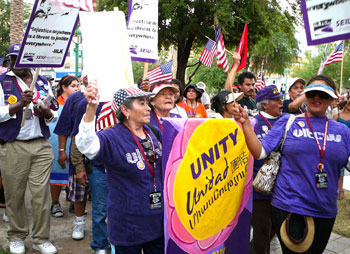

Vol. 74/No. 31 August 16, 2010

|
| Militant/Naomi Craine |
| July 29 demonstration in Phoenix to protest anti-immigrant law set to take effect that day |
The caravan joined one of several marches and actions in Phoenix protesting Arizona Senate Bill 1070. There were also demonstrations in cities across the country, including New York, San Francisco, Miami, and Chicago.
Major sections of the law were blocked by a court injunction the day before, including the requirement that police check the immigration status of everyone they stop if they have “reasonable suspicion” the person is in the country illegally. State penalties for immigrants who do not carry their documents with them at all times were also struck down. Other parts of the law, including a ban on “harboring or transporting” undocumented workers, were allowed to stand. The bill echoes already existing federal laws, but adds state penalties.
One of the biggest California contingents in Phoenix was from the Service Employees International Union (SEIU), which included many African American workers. Brendloyn Hendrix, a home-care worker, said the trip to Phoenix was important. These types of laws are not just aimed at workers whose “skin is brown,” she said. She also talked about the threat by California governor Arnold Schwarzenegger to slash home health services. “We’ve been more than three years without a raise and without a contract,” she pointed out.
“People shouldn’t be looked at differently,” said Karen Smith, a member of the executive board of her SEIU local and of the NAACP in Oakland, California. “Anyone should have the right to go wherever they please. I’m here to support that.” Smith was talking to Eleanor García, the Socialist Workers Party candidate for U.S. Congress from California District 33, who also took part in the caravan from Los Angeles.
García explained that her campaign joins the fight of immigrants for legalization and stresses the need for working people to build a labor party based on the trade unions, the most basic organizations workers have to organize solidarity and defend their interests. “The unions need to be a bigger part of fights like this,” agreed Smith. She was interested in what the socialist candidate had to say about the unions acting independently of the Democrats and Republicans.
After arriving in Phoenix, the Los Angeles unionists took part in a community forum and then marched to the state capitol, where there has been an ongoing vigil organized by local religious organizations since SB1070 was signed. Early in the day, several hundred marched to the Maricopa County Jail and blocked the entrance. Twenty-three of those carrying out civil disobedience were arrested.
The day of the action Sheriff Joseph Arpaio launched his 17th immigration sweep in the Phoenix area. During such roundups, deputies and volunteer cops stop people for minor violations like jaywalking. They then check the immigration status of those questioned, which the cops are allowed to do under existing federal law.
“Nothing is going to deter this sheriff and my office, including rulings by the federal judge,” Arpaio told reporters that day. “It’s going to be business as usual.”
The sections of the law that are on hold “would have been a nice little extra twist if we could have locked them up instead of handing them over to ICE [Immigration and Customs Enforcement],” Arpaio said following the injunction.
Workers gathering at the capitol for the rally talked to García about what they face. Araceli Ramírez, who works as a nurses aide in Phoenix, said, “The law would affect all of us badly, because people look at you differently. It affects me on the job even though I’m a citizen. I’ve been caring for the elderly for 15 years. It doesn’t matter our nationality—we’re all human beings.”
Cecilia Martínez, a young restaurant worker, explained how she’s been devastated by the economic crisis. “I lost my job. My husband has two jobs, but he’s getting less hours. We’re going down and I don’t see where the bottom is.” Martínez said the government does nothing to turn around the problems workers face; instead it scapegoats immigrants.
Related articles:
Demonstration at Chicago jail says no to anti-immigrant law
New York march condemns Arizona law
Front page (for this issue) |
Home |
Text-version home